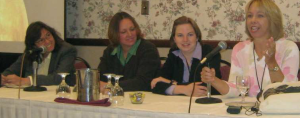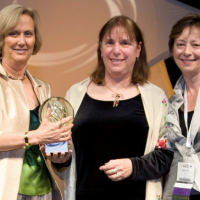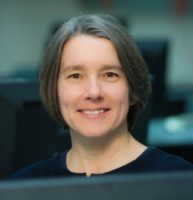Distinguished Lecture Series Brings Research Talks and Recruitment to College Campuses
Originally Posted in Winter/Spring 2009 Newsletter
The Distinguished Lecture Series (DLS) is designed to encourage women and minority undergraduates to pursue graduate education in CISE and to increase the visibility of distinguished women and minority researchers from academia and industrial or govern-ment research labs. It began as a CRA-W program in 2000 with funding from Lucent and is now run in cooperation with the Coalition to Diversity Computing (CDC) with NSF support. The current co-directors of the program are Professor Nancy Amato (Texas A&M) and Dr. Dilma Da Silva (IBM Research).
The DLS program arranges visits of distinguished re-searchers to the host campus, usually including both a prominent professor and a senior researcher from an industry or government lab. A DLS event features technical talks by the faculty and lab researchers. Often, one of these presentations is incorporated into the host university’s own distinguished colloquia series. A typical event also includes a variety of recruiting activities aimed at undergraduates. In particular, the format of our graduate recruiting workshop has proven to be very effective. This is a panel discussion with the visiting distinguished speakers discussing both academic and industrial career paths for those who earn a graduate degree in computing. The panels also include current women and minority graduate students who can give a “view from the trenches” of the graduate school experience and application process. The panelists discuss their reasons for choosing to attend graduate school and briefly explain their research before inviting questions from the audience.
These events give students the opportunity to interact with successful women and minority researchers who can serve as powerful role models and provide information to help them make an informed decision about whether graduate school might be right for them. Students from underrepresented groups are encouraged to meet with the speakers at lunch to discuss issues and concerns in a smaller group setting. There may also be meetings with graduate students and with faculty of the host institution who are interested in recruiting and retention of students from underrepresented groups. Information about other CRA-W/CDC programs is made available to students and faculty.
Over the eight years of the program, 41 events have been organized at a range of sites including major universities, small liberal arts colleges, minority-serving institutions, women’s colleges, and regional consortia. Some of our most successful events have involved multiple cooperat-ing universities with transportation arranged for attendees coming from the non-host schools (an example was an event coordinated between the University of Mississippi and Mississippi Valley State). These events have exposed undergraduate students to remarkable women and minority researchers such as Ramón Cáceres (AT&T Labs), Jeanne Ferrante (UCSD), Helen Gu (IBM Watson), Monica Lam (Stanford), Susan Landau (Sun Labs), Bar-bara Liskov (MIT), Pat Selinger (IBM Almaden), Valerie Taylor (Texas A&M), Sihem Amer-Yahia (Yahoo! Re-search), Jeannette Wing (CMU) and many more. Especially for students at small 4-year colleges and universities with a primarily teaching focus, the access to advice and guidance from distinguished faculty from top graduate departments is a benefit that they might not have found otherwise. Highlighting the accomplishments of successful women and minority researchers offers important role models to all students, whether male or female / minority or majority.







